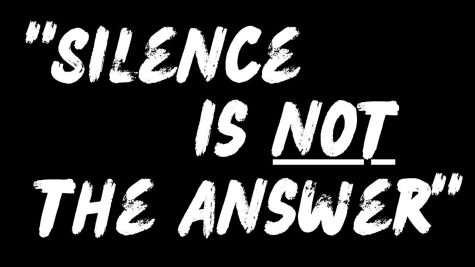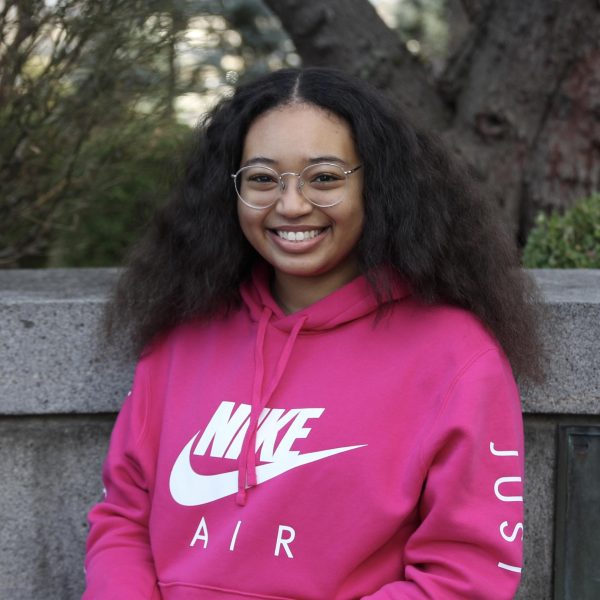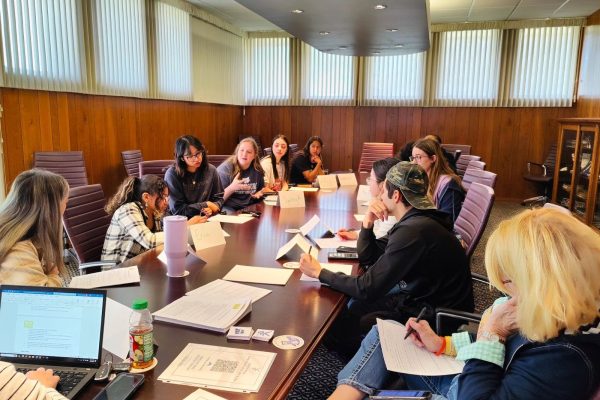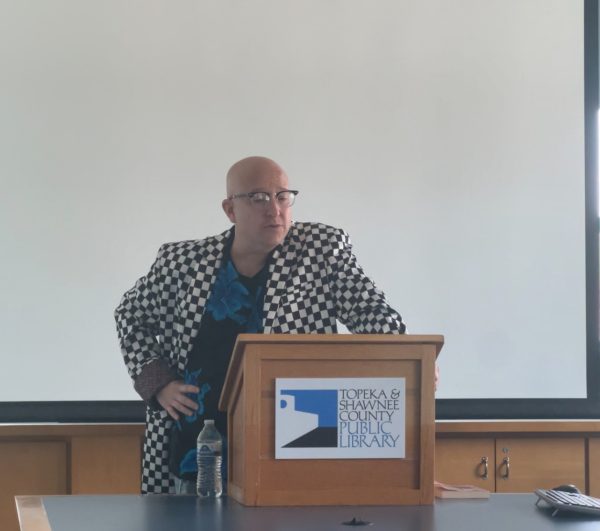BSU recites a list of requests for Washburn administration

On Tuesday, Nov. 29, the Washburn Black Student Union held a “Peaceful Takeover Rally” where students protested against faculty’s silence following the Halloween incident with Holly O’Neil, associate professor of chemistry and interim assistant dean of the College of Arts and Sciences.
During the protest, BSU read out a list of requests made for the administration in 2019. After several incidents of racism, previous BSU members created the list to encourage faculty to take action and better serve Black students.
BSU has added one more request to this list from the originals, as well as notes concerning the progress that has or has not been made. The following is a released statement from BSU detailing those requests and updates:
“Requests From Black Student Union to Washburn administration included with progress made since demonstration in 2019:
1. Immediately identify a location for a Washburn University Multicultural Student Resource Center.
Multicultural student resource centers are available for students at several Kansas universities and are best practice to support multicultural student development, recruitment and retention. The absence of a multicultural student resource center at Washburn is a shameful indicator of the lack of commitment to build a diverse campus with an office that supports multicultural students. Failure to meet this low-cost demand to meet multicultural students’ needs communicates that Washburn leadership does not care about the experience of multicultural students. Students have been bringing this request to Washburn leadership for at least three years with no action or response. Washburn students are ready to transfer to other schools who have multicultural centers.
- Steps to locate a space for a multicultural resource center were taken quickly and a group of students, faculty and staff was assembled for input on creating the space. Two members of the groups were officially representing BSU. In October 2019, these two BSU students stopped receiving emails about the planning and building of the Multicultural Resource Center. When the opening of MILS was announced publicly in summer 2020, BSU students and BSU alumni were unaware that the project was finalized, upset about the name and angry that the space they requested was not the space created.
2. Establish mandatory diversity training for all Washburn faculty, staff, administration and police by August 2019.
There has been a lack of diversity training that impacts all students in the learning environment and campus climate. Faculty and staff who interact with Washburn students who have not had training have caused students to want to leave Washburn University. The training that is available is not required for the persons who need it most. We believe this training has not been required because Washburn does not consider the well-being of multicultural students to be a high priority. We want a comprehensive, detailed action plan for required training by August 2019.
- Mandatory diversity training for all Washburn faculty, staff and administration has not been made a requirement. No comprehensive, detailed action plan for requiring training had been provided to students.
3. Create an ethnic studies minor by spring 2020, with the commitment from the university to create an ethnic studies department and major by fall 2021.
We also demand that an introductory ethnic studies course also be made a requirement for every student to take in order to graduate from Washburn University. This course must also include cultural sensitivity and awareness and an overview of the political and social power of privilege. Requiring such a course for graduation will benefit ALL Washburn students by preparing them for a diverse workforce as well as preparing them to understand implicit bias in their interactions with others.
- No ethnic studies courses are required for graduation. Working with students in BSU and HALO, a faculty committee created a plan for an ethnic studies major to encompass studies in Native American studies, Latinx studies, Asian American studies and African American African diaspora studies. With student guidance, the plan would begin with a common required course in race and ethnic studies and establishing one of the minors to include in the ethnic studies program — the African American African diaspora studies minor. These two first steps have been implemented; however, no BIPOC full-time faculty have been hired to support the new minor or an ethnic studies major. Almost all classes taught in the AAADS minor are taught by white faculty. Additionally, the interim director of the AAADS minor receives no compensation for this position.
4. Provide a detailed recruitment and retention plan for multicultural students.
We demand that by July 1, 2019 the university administration will outline a detailed action plan, including financial resources for said plan, to recruit and retain multicultural students and to especially include students from within the 501 school district and the surrounding Topeka community. Washburn should set goals to increase the multicultural student community by the fall of 2020.
- No plan, if it was created, has been shared with BIPOC students or made public.
5. Provide a plan and commitment to recruit and retain faculty and staff of color and LGBTQ+ faculty and staff.
6. Create a university policy to address ‘hate speech’ that is different from ‘free speech’ that also includes a commitment from university administrators to support targeted students and to condemn hate speech.
We demand that a protocol be created for the handling of hate speech. Many times, on this campus, the administration has chosen to remain silent when students have been targeted with violent, racist, homophobic, xenophobic and/or transphobic speech. When Washburn University’s administration remains silent, the administration communicates to our campus community not everyone matters. University silence and lack of any mobilization around this violent speech stands in direct contrast to our core value of ‘inclusion.’ Washburn can create a policy that points out the negative effect of hate speech and provide support to students most affected by hate speech.
- No such protocol has been openly shared with students if it was created. Students have made reports to Washburn administration about racist symbols displayed on campus, which may be included in definitions of ‘hate speech.’ Despite reports, such racist behavior has not been publicly and swiftly condemned. Additionally, no policy has been made public that ‘provide[s] support to students most affected by hate speech.’
Washburn University must hire more people of color and LGBTQ+ individuals as faculty members, counselors and administrative staff members. It is unacceptable that the majority of administration, professors and staff members are heterosexual and white. There are more people of color working in food service and cleaning jobs on this campus than there are staff and faculty. We demand the university set goals to increase the number of staff and faculty of color and LGBTQ+ staff and faculty by fall 2020.
- Goals to increase the number of ‘staff and faculty of color and LGBTQ+ staff and faculty’ have not been made public or shared with BIPOC students. Additionally, no retention plan has been made public.
7. Create a different avenue for students to report discrimination and racial tensions.
Many of our fellow Ichabods do not feel comfortable going through the extensive and long process of a discrimination investigation. From the evidence we have gathered, we conclude that the interaction with Dr. Foster is damaging and unwelcoming for us. Students also feel like this long process is often to no avail. As a result, we believe that there needs to be the creation of a separate committee consisting of students, faculty and staff to review concerns from students who do not wish to go through the current investigative process. This way students feel like their voices are being heard and social justice actions can be taken on their behalf. An example of how this process should be used is if a student has an encounter with a person who speaks or behaves with hostility because of their identity, then the student can report the concern and the committee will evaluate and come up with an acceptable solution.
- A campus climate team was put in place. Few students know about this process, how it works or who participates on the various levels. Students are not included on any of these levels. More than once, a student has made a report through the campus climate reporting website and waited more than one week to receive a response though the site affirms a 24-hour response time.
8. Transparency in the processes.
We ask that the investigations under review by Title IX and Equal Opportunity Director instill a process that includes a doable timeline that is made aware to the public, so we are able to know the status of the investigation within the 30-day period. As students we deserve the right to know what’s going on our campus and provided transparency from our university. We also ask that after the first 30-days of an investigation, a statement is made at about where the investigation is at in closing. Then upon closure of the investigation, a statement is made about what will be done to solve the complaint publicly.”
The Washburn Review will continue to publish updates to this story as it progresses.
Edited Glorianna Noland, Justin Shepard
Your donation will support the student journalists of Washburn University. Your contribution will allow us to purchase equipment and cover our annual website hosting costs.









